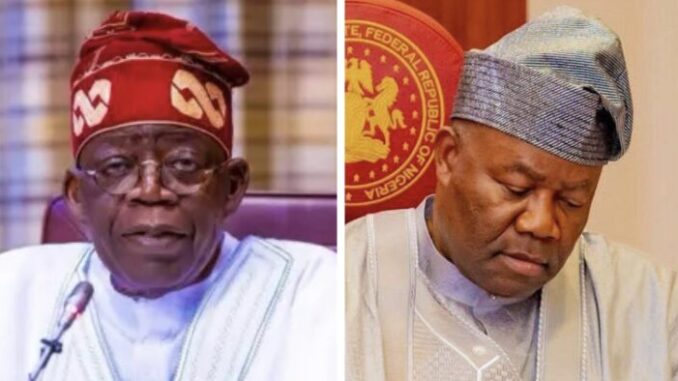
According to a report by People’s Gazette, lawmakers at Nigeria’s National Assembly were allegedly offered financial incentives to support President Bola Tinubu’s emergency proclamation in Rivers State. The move, which aims to dissolve democratic institutions in the state, has sparked significant controversy.
Lawmakers Report Cash Offers to Back Emergency Rule
People’s Gazette reports that 11 lawmakers—comprising seven senators and four representatives—confirmed receiving offers ranging from $15,000 to $25,000. These alleged payments were aimed at securing their support for the president’s invocation of Section 305 of the Nigerian Constitution, which would remove Governor Simi Fubara and state legislators while imposing military administration.
A legislator who spoke with People’s Gazette on Thursday morning described reluctance among members to attend parliamentary sessions, particularly those from Borno State, whose governors had reportedly advised against supporting the emergency rule.
Low Turnout in Parliament Raises Concerns
At a crucial House plenary session on Thursday morning, only 113 members were present—falling short of the 120 required for a simple quorum. Sources cited by People’s Gazette suggest that in response to this low turnout, discussions about financial inducements were held among the president’s allies, including Senate President Godswill Akpabio.
Following interviews with 14 lawmakers, People’s Gazette states that 11 confirmed being approached with offers. Of these, seven admitted to receiving $25,000 each, while four said they were given $15,000. Only two legislators reportedly refused the offers, and opposition senator Seriake Dickson stated he was not approached at all.
Alleged Bribes Distributed Amidst Legislative Uncertainty
The lawmakers, according to People’s Gazette, collected the alleged payments from various locations in Abuja. Reports indicate that the push for legislative approval intensified from Wednesday evening when it became clear that securing the necessary votes would be difficult.
President Tinubu had declared the emergency on Tuesday night, citing heightened political tensions between Governor Fubara and lawmakers loyal to former Governor Nyesom Wike. As part of the declaration, he appointed retired naval chief Ibok-Etuk Ekwe Ibas to govern the state for six months.
Constitutional Debate and Public Outcry
The president’s decision has drawn widespread criticism from legal experts and the public, with many questioning its constitutionality. The Nigerian Constitution mandates parliamentary approval within 48 hours for an emergency proclamation to take effect. However, legal analysts argue that the constitution does not grant the president the power to dismiss an elected state government.
During Wednesday’s session, only 80 out of 360 House members attended—falling significantly short of the 120 needed for a simple quorum. The ratification of the emergency rule requires a two-thirds majority—240 House members and 73 senators—a threshold that appears increasingly difficult to meet.
As developments unfold, the controversy surrounding the emergency rule in Rivers State continues to raise critical questions about democratic governance and constitutional limits in Nigeria.
Leave a Reply